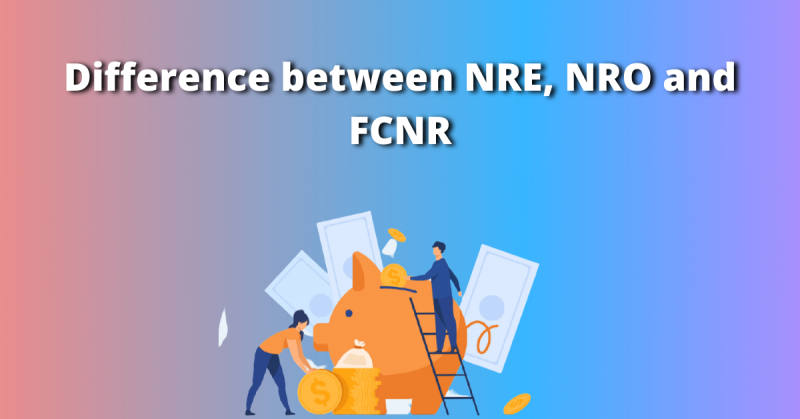Difference between NRE, NRO and FCNR
A non-resident Indian is a native of India or a person of Indian ancestry who is not a native of India. A non-resident Indian (NRI) or a person of Indian ancestry (PIO) can open an NRI account with a financial institution such as a bank. A non-resident Indian (“NRI”) can open multiple accounts in India to manage income earned both inside and outside the country. NRIs can open three different sorts of accounts: NRE, NRO, and FCNR. The following are some of the highlights:
External account for non-residents (NRE)
A non-resident external account is a savings account in which a person can deposit money in a foreign currency and freely withdraw it in their home currency. The Indian rupee is used to keep track of all funds deposited, hence these are INR-based accounts. When you deposit foreign money into this account, the receiving bank applies the current exchange rate and deposits Indian rupees equal to the exchange rate in your account. An NRE account can be started on your own or with the help of others. A joint account, on the other hand, can only be unlocked with the addition of one more NRI.
Features to look for:
- Money is tax-free and can be re-exported.
- Allows for the transfer of foreign cash to India in order to keep the INR balance in check.
- On your NRE account, you can earn up to 4.35 percent interest.
- Due to currency fluctuations, the NRE account bears a foreign exchange risk.
- In India, it is not taxable.
NRO account (non-resident ordinary account)
A regular non-resident account is a savings account into which a person can deposit money earned in India. An NRO account can be used to deposit Indian payments such as dividends, pensions, rentals, and other sources of income. An NRO account makes international money transfers easier. One can keep money in this account in Indian or foreign currency.
Key features:
- Allows you to manage your money from many sources in India.
- When you deposit foreign currency into NRO, the exchange rate is used to convert it into INR.
- Withdrawals are only available in INR.
- Every financial year, you can re-settle up to USD 1 million from this account.
- There is no foreign exchange risk with an NRO account.
Foreign currency non-resident (FCNR) accounts
A FCNR account is a term deposit account used to deposit foreign money earned abroad. It allows an NRI to deposit money in the currency of their choice. In addition, the deposits made should be from the NRI’s home country’s profits. While opening an FCNR account, monies can be transferred from an NRE account. The interest rate for FCNR accounts is determined by the custodian.
Key features:
- An FCNR account holder can keep their funds in any of the nine RBI-approved currencies: USD, GBP, AUD, SGD, CAD, CHF, HKD, EUR, and JPY.
- The deposit has a term of 1 to 5 years.
- The sum placed as well as the interest generated on it are fully reimbursable.
- Allows for automatic deposit renewal at maturity.
- In India, it is not taxable.
Opening NRE, NRO and FCNR accounts online
You can open your NRE, NRO, and FCNR accounts online as an NRI.
You can open an account by filling out the account opening form on the bank’s website and providing examined copies of the required documents as specified on the form. If you want to register an online account, you’ll need to get your documents authenticated by the embassy of the nation where you live. You will also be required to complete a number of tasks.
The Benefits of Having an NRI Account in India
The following are some of the advantages of having an NRI account in India:
- India’s Investments
- Taxation Repatriation
- Minimum balance is low.
- Deposits in multiple currencies
- The disadvantages of establishing an NRI account in India
The drawbacks of creating an NRI account in India are as follows:
- Liquidity issues
- Risk of fluctuating currency exchange rates

